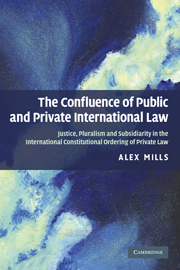 The Confluence of Public and Private International Law
The Confluence of Public and Private International Law Book contents
- Frontmatter
- Contents
- Acknowledgments
- Index of cases, judicial opinions and arbitral awards
- Abbreviations
- 1 Justice, pluralism and the international perspective
- 2 The private history of international law
- 3 From positivism to constitutionalism
- 4 Private international law and constitutional law in federal systems
- 5 The confluence of public and private international law
- 6 Conclusions
- Bibliography
- Index
1 - Justice, pluralism and the international perspective
Published online by Cambridge University Press: 20 January 2010
- Frontmatter
- Contents
- Acknowledgments
- Index of cases, judicial opinions and arbitral awards
- Abbreviations
- 1 Justice, pluralism and the international perspective
- 2 The private history of international law
- 3 From positivism to constitutionalism
- 4 Private international law and constitutional law in federal systems
- 5 The confluence of public and private international law
- 6 Conclusions
- Bibliography
- Index
Summary
Introduction
This book is about the relationship – past, present and future – between public and private international law. In the study of international law, a sharp distinction is usually drawn between public international law, concerned with the rights and obligations of states with respect to other states and individuals, and private international law, concerned with issues of jurisdiction, applicable law and the recognition and enforcement of foreign judgments in international private law disputes before national courts. Private international law is viewed as national law, which is and ought to be focused on resolving individual private disputes based on domestic conceptions of justice or fairness. Some acknowledgment of the international dimension of private international law problems is given through the role played by the concept of ‘comity’, but its status remains ambiguously ‘neither a matter of absolute obligation, on the one hand, nor of mere courtesy and good will, upon the other’. In turn, public international law traditionally neglects the analysis of private international interactions and disputes, which are viewed as outside its ‘public’ and ‘state-centric’ domain. Thus, public and private international law are viewed as distinct disciplines, as two separate intellectual streams running in parallel.
The central project of this book is to challenge this conventional distinction on both descriptive and normative grounds, identifying and building a conceptual bridge between public and private international law to replace the precarious connection equivocally acknowledged through the concept of ‘comity’.
- Type
- Chapter
- Information
- The Confluence of Public and Private International LawJustice, Pluralism and Subsidiarity in the International Constitutional Ordering of Private Law, pp. 1 - 25Publisher: Cambridge University PressPrint publication year: 2009


